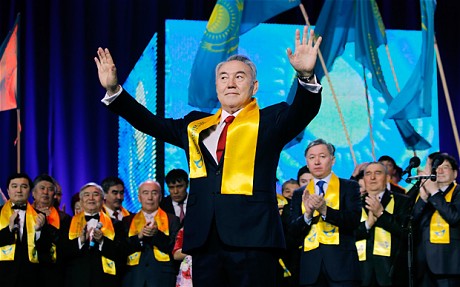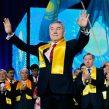
Nazarbayev Celebrates Landslide Victory, Promises Multi-Party Parliament
Publication: Eurasia Daily Monitor Volume: 8 Issue: 69
By:

On April 3, more than nine million voters in Kazakhstan went to the polls to participate in the early presidential election. The final results of the voting announced by the Central Election Commission on April 5, indicates that the incumbent President Nursultan Nazarbayev garnered 95.5 percent of votes, while other contenders showed ridiculously miserable results. None of the three little-known rivals of Nazarbayev, (People’s Communist Party nominee, Zhambyl Akhmetbekov, environmentalist, Mels Yeleusizov, and the leader of the Party of Patriots of Kazakhstan, Gani Kasymov) gathered even two percent of the vote.
Throughout the election campaign, attempts by the Central Election Commission to lend the process an air of a multi-party election were generally derided as a “puppet show,” with candidates who could not even conceal that they had no serious intention to challenge Nazarbayev. In the 2005 presidential elections Nazarbayev stood against four candidates representing various political parties and faced a strong challenge from the opposition block leader Zharmakhan Tuyakbai. Amid the accusations of fraud and multiple violations of the election law, Nazarbayev won 91 percent of the votes in 2005.
His astounding victory in this year’s snap election can be explained by a favorable political setting after the split among opposition ranks and economic trump-cards effectively used by Nazarbayev to win public support. Addressing his supporters in all regions of Kazakhstan from the central office of his Nur Otan People’s Democratic party during a televised celebration shortly after the announcement of the first election results on the night of April 3, Nazarbayev said that his election victory meant popular support for his policy of the “modernization of public life.” The president said, brushing aside criticism from the Organization for Security and Cooperation in Europe (OSCE) and other international observers that the voting procedure went smoothly, in strict compliance with the election law. “All candidates for the presidency were given equal rights, access to the media and opportunities in every region, district and town to present his election program” Nazarbayev added (Khabar TV, April 3).
Election authorities did their best to make the voting procedure look transparent and open for 1,059 international observers and 200 foreign journalists. The election law in Kazakhstan is arguably more advanced than that in other Central Asian nations. OSCE/ODIHR observers avoided any strong criticism during the election campaign, stating that “the election process is flawless in no country,” but noting at the same time that political parties are underrepresented in local election commissions. Nurlan Yerimbetov, the chairman of the Almaty-based public commission for monitoring elections, believes that Kazakhstan’s election law needs substantial improvement concerning the registration of candidates, collection of signatures and the work of the linguistic commission (Panorama, March 31).
State-controlled media in Kazakhstan, deaf to outside criticism and reports of numerous irregularities, identical and presumably false signatures on voting papers, the absence of genuinely contesting political parties and public movements as stated in OSCE/ODIHR report, merely parroted positive assessments of the elections from Russian observers who praised the voting process as democratic, free and transparent. However, it could not be concealed from the general public that the whole show was directly stage-managed by local officials from the all-powerful pro-presidential Nur Otan party. University teachers practically in every region received instructions from them to organize student support rallies during the campaigning for Nazarbayev. One of the election commission members stated that an overzealous head of an educational establishment was removed from his post for ordering all his students to go to the polling station against their will (KTK TV, April 4).
However, harsh local authorities tried to ensure a high turnout using such unconstitutional methods, though the result was much lower than expected. In highly politicized Almaty the turnout in polling stations did not exceed 68.1 percent of the voters. In the capital Astana only 68.1 percent of the electorate cast their votes. In the mostly Kazakh-populated Kyzylorda region in the south reported 94.9 percent participation of the voters and in the economically advanced Aqtobe region the turnout reached the highest figure of 95.1 percent. The Central Election Commission reported an average turnout of 89.9 percent (Khabar TV, April 5).
Yet, even this official figure cannot be accepted at face value, since following the majority of the opposition parties, the Bibi Ana Association of disabled mothers and the Ult Tagdyry (the Fate of the Nation) Kazakh nationalist public movement led by a prominent public figure Dos Koshim, refused to take part in the elections.
Nazarbayev’s de facto single-party system, much criticized by the OSCE and other international organizations played a key role in ensuring him the election victory. The docile parliament entirely consists of Nazarbayev’s Nur Otan party, a fact that provokes strong pressure from international democratic institutions. But immediately after the elections Nazarbayev demonstrated his willingness to address the situation. On April 4, during a news conference in Astana he vowed that from the next parliamentary election more political parties would be represented in the legislative body of the country. “We will also keep in the focus of attention the freedom of the media,” Nazarbayev added. According to Nazarbayev, the pro-presidential Kazakhstan 2020 Democratic Coalition, consisting of a handful of loyal political parties and movements originally created to support him in the previously planned referendum and then in the snap election, provides a good basis for a multi-party dialogue (www.kazinform.kz, April 4).
Nazarbayev’s widely predicted election victory provoked a mixed reaction outside Kazakhstan. While the West displayed some reservations, Russian President Dmitry Medvedev and his Chinese counterpart Hu Jintao were the first to send congratulations telegrams to their Kazakh friend.




